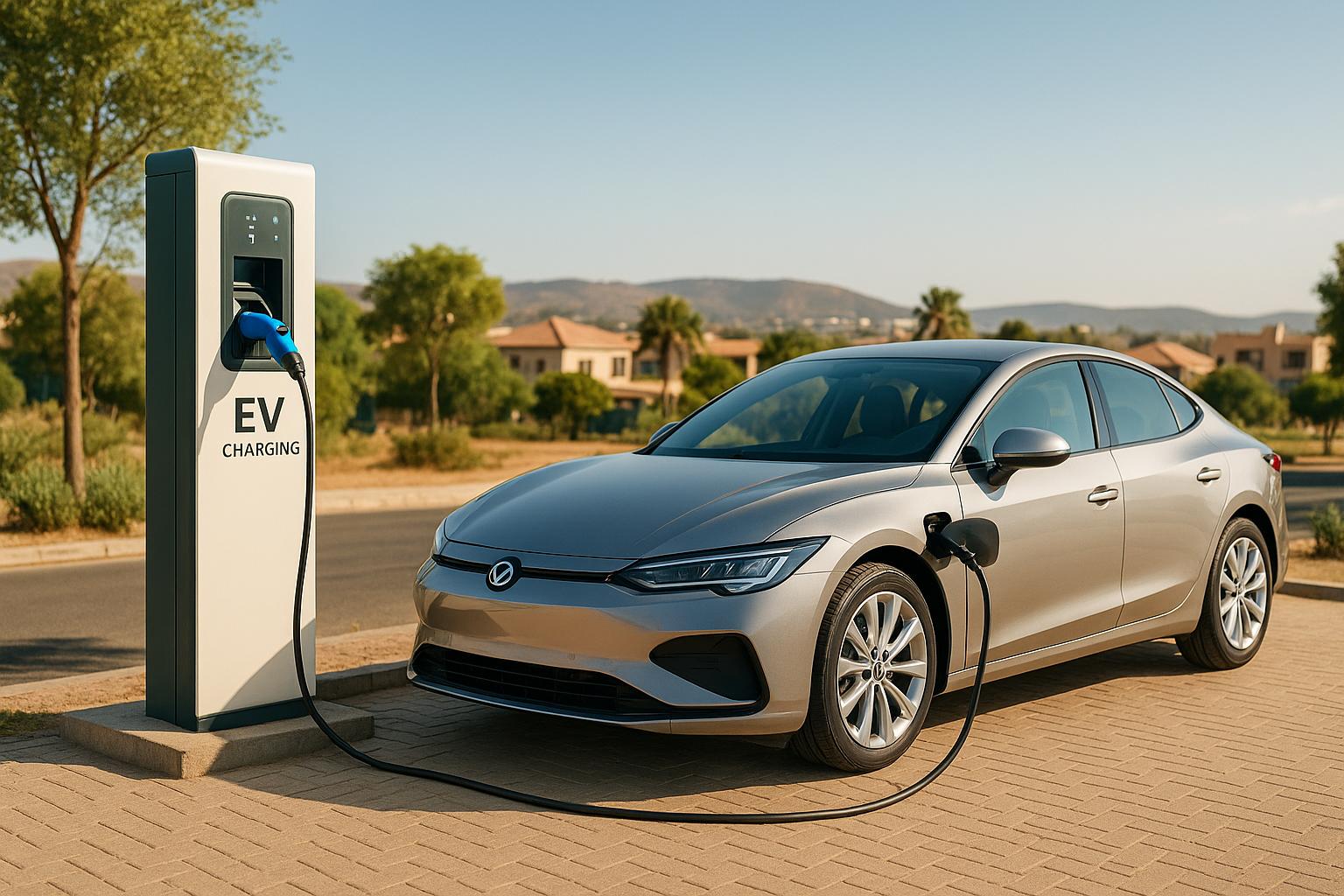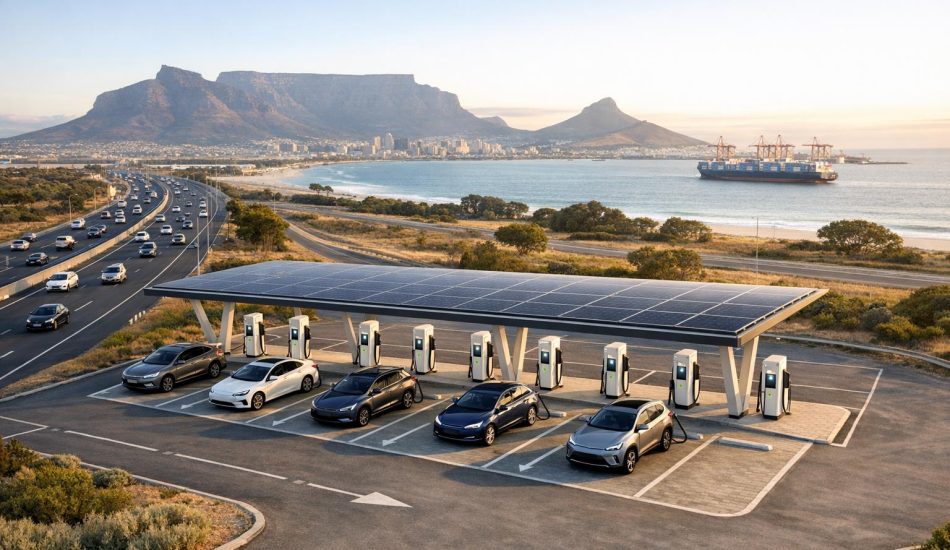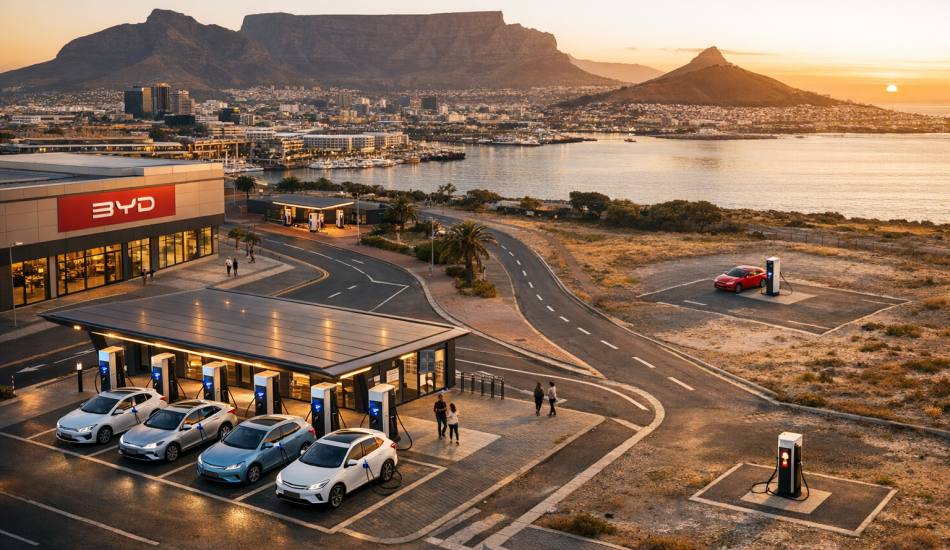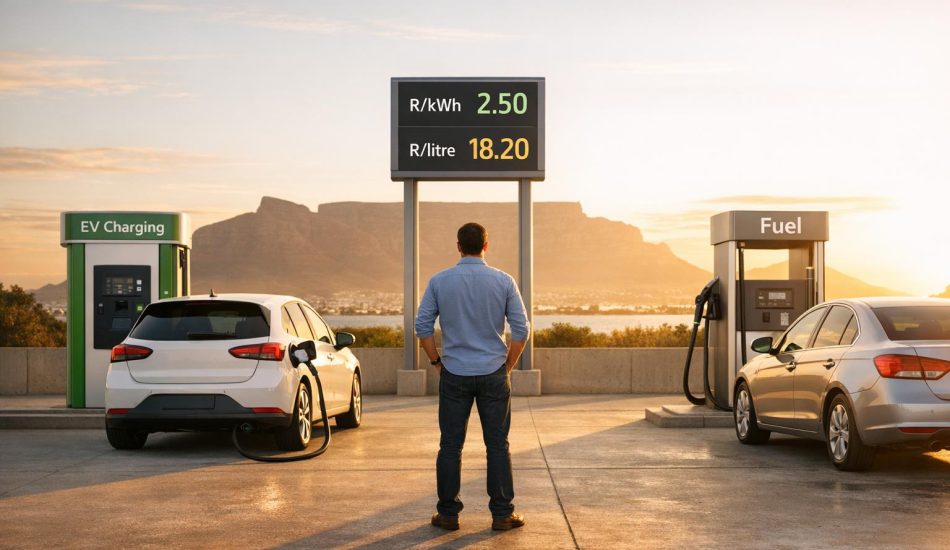
South Africa is making progress in the electric vehicle (EV) market, but challenges remain. Here’s the key takeaway: EV adoption is growing, supported by new models, lower prices, and improved charging infrastructure. However, issues like power outages, rural access, and high upfront costs still need to be addressed.
Key Points:
- Vehicle Options: BYD leads with models like the Dolphin ($21,000) and Atto 3 ($30,500). Pre-owned EVs, such as the Nissan Leaf, start at $13,200.
- Charging: Over 500 public charging stations exist, with plans for solar-powered, off-grid options to address energy reliability.
- Costs: EVs save on fuel and maintenance compared to gas cars, though initial prices are higher.
- Government Support: Import duties on EVs reduced to 15%, boosting affordability.
- Private Sector Role: Platforms like EV24.africa simplify buying and financing, while companies expand charging networks.
South Africa’s EV market has potential, but success depends on solving infrastructure gaps, lowering costs, and expanding rural access. The next few years will shape the country’s EV future.
TCS | We test drive South Africa’s cheapest electric car
EV Charging Infrastructure Status
South Africa’s push toward electric vehicles is heavily tied to the development of its charging network, which is still in the early stages. Currently, most charging stations are concentrated in urban hubs like Cape Town, Johannesburg, and Durban, leaving rural areas with limited access. This imbalance has sparked efforts to address these gaps.
Public Charging Stations and Growth Plans
The current urban-centric setup underscores the need for a broader, more inclusive infrastructure. To tackle this challenge, plans are underway to introduce off-grid, solar-powered charging solutions. These systems sidestep the high costs associated with extending the electrical grid, offering a practical way to expand EV accessibility across the country. Such innovative approaches are central to South Africa’s mission to modernize its EV ecosystem.
Electric Vehicle Options and Pricing
South Africa’s electric vehicle (EV) market is steadily expanding, offering choices that cater to both budget-conscious buyers and those seeking luxury. With an increasing number of new and pre-owned EVs available, electric mobility is becoming a more realistic option for many consumers.
Available EV Models
BYD has taken a leading role in the South African EV market, offering models like the Dolphin compact car priced at approximately $21,000, the Atto 3 SUV at around $30,500, and the Seal sedan. The company plans to grow its dealership network to 30–35 locations by 2026, signaling its long-term commitment to the region.
Other automakers such as Hyundai, Toyota, Volvo, Mercedes, BMW, and Tata Motors also have EV models available across various segments. However, while Tesla remains a global name in electric cars, it has yet to establish an official presence in South Africa.
For those considering pre-owned options, platforms like EV24.africa list models such as the Nissan Leaf and BMW i3, with prices ranging from $13,200 to $18,500. This growing secondary market opens up more affordable pathways for consumers interested in making the switch to electric mobility.
These diverse offerings provide a solid starting point for comparing EV ownership costs with those of traditional gas-powered vehicles.
Price Comparisons: EVs vs Gas Vehicles
While EVs generally come with higher upfront costs, they often prove to be more economical over time due to savings on energy and maintenance.
| Category | New EV (BYD Dolphin) | Used EV (Nissan Leaf) | Gas Vehicle (Toyota Corolla Cross) |
|---|---|---|---|
| Upfront Cost | $21,000 | $13,200–$18,500 | $18,500–$23,800 |
| Annual Fuel/Energy | $440 (home charging) | $440 (home charging) | $990 (gasoline) |
| Annual Maintenance | $300–$400 | $350–$500 | $600–$800 |
Despite their initial price tag, EVs often win out in the long run. Electricity, especially when sourced from home solar setups, is significantly cheaper than gasoline. Additionally, EVs require less maintenance because they have fewer moving parts, no need for oil changes, and experience less brake wear. Even public charging stations offer competitive rates compared to gasoline costs.
Luxury EVs from brands like BMW and Mercedes can cost upwards of $55,000, while comparable gas-powered vehicles are typically less expensive. However, as entry-level EVs become more affordable, they’re increasingly competitive when factoring in long-term ownership costs.
Financing and Access Options
The lower ongoing costs of EV ownership are complemented by a variety of financing options available to South African buyers. Traditional vehicle loans are readily available, but many financial institutions now offer specialized green financing products aimed at encouraging EV adoption. Some even provide reduced interest rates for EV purchases.
Platforms like EV24.africa simplify the process by offering integrated financing and delivery services. Their lineup includes budget options like the Geely Panda Mini starting at $5,880, as well as high-end models such as the ZEEKR 009 priced at $85,000. With transparent pricing, flexible payment plans, and an easy online application process, they make EV ownership more accessible.
Dealerships also offer installment plans, though the higher upfront costs of EVs can result in larger loans or longer repayment terms compared to gas-powered vehicles. As demand for EVs grows, the financing landscape is evolving to better meet consumer needs.
For buyers on a tighter budget, pre-owned EVs present an appealing alternative. These vehicles come with lower price tags, making it easier to secure smaller loans and enjoy reduced monthly payments – all while benefiting from the lower running costs that EVs offer compared to traditional cars.
Affordability and Ownership Costs
When considering the cost of owning an electric vehicle (EV), it’s essential to look beyond the sticker price. Factors like charging expenses, maintenance savings, and government incentives all play a role in the overall cost. Let’s break it down further.
Charging Costs: Home vs. Public Options
Charging your EV at home is typically the most cost-effective option, especially if you take advantage of off-peak electricity rates. On the other hand, using public fast chargers can be significantly more expensive. Relying heavily on public charging stations can quickly drive up your overall costs.
Fuel Prices vs. Electricity Rates
South Africa’s fuel prices have been notoriously unpredictable, making EVs an appealing alternative. Electricity rates, while not immune to fluctuations, are generally more stable. Additionally, the ongoing decline in lithium-ion battery costs – from $186 per kWh in 2022 to a projected $156 per kWh by 2025 – is narrowing the price gap between EVs and traditional cars.
Government Incentives and Policies
To make EVs more accessible, the South African government has reduced import duties on electric vehicles from 25% to 15%. This policy change has helped lower upfront costs and made EVs more competitive in the market. These combined factors shape the true cost of making the switch to electric vehicles in the country.
sbb-itb-99e19e3
South Africa’s EV Challenges and Opportunities
South Africa holds potential for electric vehicle (EV) growth but faces several challenges that also create unexpected business opportunities. Understanding these factors is crucial for anyone considering the shift to electric mobility.
Infrastructure Gaps and Solutions
Charging infrastructure in South Africa is heavily concentrated in urban hubs like Cape Town and Johannesburg, leaving rural regions underserved. This uneven distribution makes long-distance EV travel difficult and limits adoption in less populated areas.
One solution lies in deploying mobile charging units to address peak demand in remote locations. Additionally, solar-powered charging stations could play a pivotal role in rural areas where connecting to the grid is either unreliable or too expensive. By combining renewable energy with EV charging, these stations not only tackle infrastructure gaps but also contribute to a cleaner energy ecosystem.
Such innovations directly address "range anxiety", a common concern among potential EV buyers who worry about running out of power during long trips.
Range Concerns and Battery Improvements
South Africa’s vast intercity distances amplify range anxiety, but advancements in battery technology are helping to ease these worries. Modern EVs now offer ranges exceeding 250 miles on a single charge, making intercity travel increasingly viable.
The declining cost of lithium-ion batteries is another game-changer, enabling higher-capacity options that extend driving range without significantly inflating vehicle prices. Meanwhile, fast-charging technology has also improved, with many stations now capable of recharging vehicles in just 30 to 45 minutes. This makes EVs more practical for road trips and long commutes.
Local Business Opportunities
The expansion of EVs in South Africa is opening up exciting economic possibilities. The country’s growing renewable energy sector is creating a natural synergy with the clean energy goals of electric vehicle adoption. Solar and wind energy projects align perfectly with the infrastructure needs of EVs, paving the way for innovative collaborations.
Local businesses are already stepping into this space. Startups and established companies alike are exploring opportunities in EV charging solutions, battery recycling, and vehicle maintenance. As environmental awareness rises, the demand for sustainable transport options is fueling these ventures.
Platforms like EV24.africa are also making waves by offering a marketplace that connects consumers with electric vehicle options across the continent. By simplifying the buying process and bridging the information gap, such services empower buyers to make informed decisions about EV adoption.
With advancing technology, supportive policies, and growing public interest in sustainability, South Africa’s EV market is poised for significant growth in the coming years.
Future EV Adoption and Market Growth
South Africa’s electric vehicle (EV) market is gearing up for a period of rapid expansion, with several factors aligning to accelerate growth over the next five years. Investments in infrastructure, private-sector initiatives, and the push for cleaner energy solutions are driving this momentum. Let’s take a closer look at the trends shaping this transformation and the role of private companies in making it a reality.
Market Predictions and Trends
The growth of EVs in South Africa hinges on addressing infrastructure challenges, particularly the availability of charging stations. Right now, the country has over 450 public EV chargers in operation, and plans are in motion to improve access even further. For instance, BYD is set to install 200–300 fast-charging stations by the end of 2026. These chargers, equipped with flash technology, can deliver up to 250 miles of range in just five minutes – a game-changer for EV adoption.
The numbers tell a compelling story. In 2022, the Africa EV charging market was valued at $31.93 million, but it’s expected to soar to $256.53 million by 2030, with an annual growth rate of 30%. To tackle grid reliability issues and expand access to rural areas, the Development Bank of South Africa is investing $5.8 million in Zero Carbon Charge’s off-grid solar charging network. This initiative aims to establish 120 stations nationwide, with about half expected to be operational by the end of 2026. These stations will be strategically placed along major routes, roughly 19 miles apart, ensuring consistent coverage for EV users.
Private Sector and Platform Impact
Private companies are playing a pivotal role in speeding up South Africa’s EV transition. Digital platforms are making EVs more accessible, with EV24.africa leading the charge as the first online marketplace for electric car purchases across all 54 African markets. By simplifying import processes and offering a wide range of models, the platform addresses key barriers to EV ownership.
Meanwhile, GridCars is strengthening the country’s charging infrastructure. With a network of over 350 EV charge points, it’s helping to create a more reliable ecosystem for EV drivers. These private-sector efforts not only enhance vehicle access and charging options but also engage consumers directly through platforms like WhatsApp, making the shift to EVs more user-friendly.
Environmental and Economic Benefits
The widespread adoption of EVs promises to deliver a host of environmental and economic benefits for South Africa. By reducing reliance on fossil fuels, EVs can significantly cut carbon emissions, especially as more charging stations begin incorporating renewable energy sources like solar power. This shift also improves urban air quality, making cities healthier places to live.
On the economic front, the growing EV market is creating jobs in areas like renewable energy, charging infrastructure, and vehicle maintenance. Local businesses are also seizing opportunities to innovate in fields such as battery technology, software development, and mobility services. Additionally, reducing fossil fuel imports could strengthen the domestic economy and enhance energy independence.
BYD’s expansion underscores the industry’s confidence in South Africa’s EV market. The company plans to grow its dealership network from 20 locations in 2025 to 30–35 by 2026. Currently, BYD offers seven models in South Africa, including five fully electric vehicles and two hybrids, catering to a range of consumer needs and budgets.
Technological advancements are also breaking down barriers to EV ownership. DC fast chargers, for example, can now deliver up to 62 miles of range in just 10–12 minutes, making long-distance travel more feasible. With supportive policies and ongoing technological progress, South Africa is well on its way to a transformative era of EV adoption in the coming decade.
Conclusion: South Africa’s EV Readiness
South Africa is at a turning point in its journey toward electric mobility. The country has made strides with a growing network of charging stations and an increasing variety of EV models, including more budget-friendly options. Projections suggest that the local EV and charging market could hit $471.3 million by 2025.
The charging infrastructure has grown significantly, evolving from a scattered setup into a more cohesive network. Innovations like Zero Carbon Charge’s off-grid, solar-powered stations offer solutions to the country’s grid reliability issues. Alongside this, the availability of affordable EV models is steadily improving, making electric vehicles more attainable for everyday consumers.
However, hurdles remain. High upfront costs, limited domestic manufacturing, and concerns about grid stability are slowing the pace of adoption. Rural areas, in particular, continue to lag behind urban centers in terms of charging infrastructure and governmental support, posing additional challenges.
The private sector is stepping in to address these gaps. Companies are streamlining the EV purchasing process through digital platforms and investing in renewable-powered charging stations that don’t rely on the national grid. Confidence in the market’s potential is evident, with the African EV charging sector expected to grow from $31.93 million in 2022 to $256.53 million by 2030.
For a seamless transition to electric mobility, platforms like EV24.africa offer a one-stop solution. You can explore electric vehicles from brands like Tesla, BYD, Volkswagen, and Mercedes-Benz. From shipping and customs clearance to local registration, the platform simplifies the process, offering transparent pricing, flexible financing, and delivery across 54 African countries.
FAQs
What challenges does South Africa face in building electric vehicle charging networks, especially in rural areas?
South Africa is grappling with a number of hurdles in building out its electric vehicle (EV) charging network, especially in rural regions. One of the main obstacles is the scarcity of charging stations, which makes owning an EV far less practical for those living outside city areas. On top of that, dealing with complicated regulations often slows the rollout of new infrastructure, adding another layer of difficulty.
The unreliable electricity grid further complicates matters. Frequent power outages, particularly in remote areas, raise concerns about the dependability of EV charging options in these regions. Overcoming these issues will demand targeted investments, simplified regulatory processes, and creative approaches to make EV charging accessible to everyone, no matter where they live.
Are the long-term savings of owning an electric car in South Africa worth the high upfront costs?
While electric vehicles (EVs) may have steeper upfront costs compared to gas-powered cars, they often make up for it with lower long-term expenses. This is largely because EVs cost less to run – electricity is typically cheaper than gasoline, and EVs require less maintenance since they have fewer moving parts than traditional internal combustion engines.
In South Africa, how much you save will depend on factors like electricity prices, access to charging stations, and any government incentives available. However, challenges such as a lack of widespread charging infrastructure and the high initial cost of EVs still make adoption difficult for many. For those who can afford the initial investment, though, the long-term financial advantages and reduced environmental impact make EVs an appealing choice.
How is the private sector helping to expand electric vehicle adoption in South Africa and addressing infrastructure challenges?
The private sector plays an important role in boosting the adoption of electric vehicles (EVs) in South Africa. Businesses are stepping up by investing in charging infrastructure, spreading awareness, and coming up with creative solutions to address challenges. For instance, many companies are teaming up with manufacturers to install public and private charging stations in key locations like shopping malls, highways, and residential areas, tackling the limited availability of charging points.
On top of that, businesses are working to make EVs more accessible. They’re rolling out financing plans, encouraging workplace charging programs, and partnering with renewable energy providers to ensure a steady and clean energy supply. These initiatives are helping close the infrastructure gaps and creating a more welcoming space for EV users in the country.




